Humankind Review
He who creates chaos, also has the ability to create peace
Certain video game genres rise and fall through the decades. Some fans would argue that the golden age of real-time strategy games is far behind us, and the future is not looking overly promising or offering much variety. Interestingly enough, despite being more complex, the 4X subgenre has managed to carry on, with a wide variety of offerings through the past few years, and more to come in the future. Players have been able to manage their empires on Earth, in space, and in fantasy settings. Perhaps the biggest franchise of them all is Sid Meier's Civilization, and few have attempted to challenge it directly. But Amplitude Studios and SEGA have tried to do just that with their new release, Humankind.
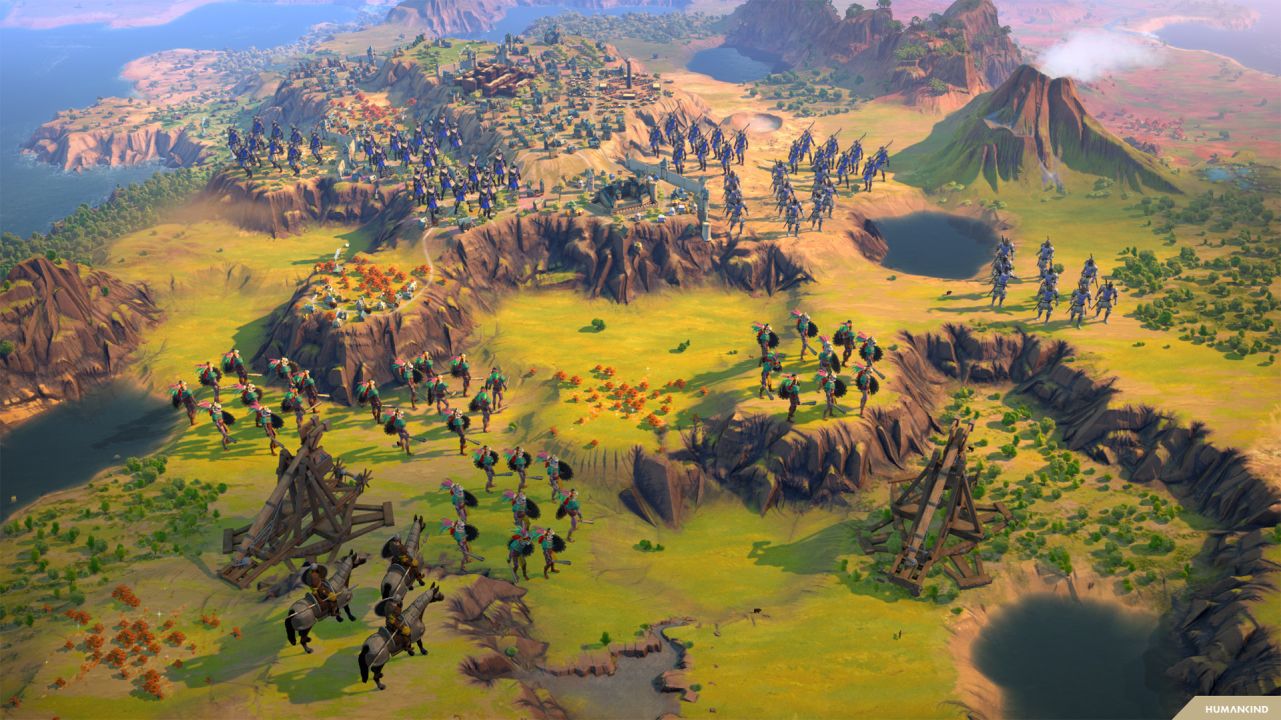
The many comparisons that will be drawn between Civilization and Humankind are not simply because they are both 4X games and Civ happens to be the dominant force. In actuality, the games are so similar in setting, gameplay, and even the UI, that it's difficult to ignore. The developers have clearly tried to thread the fine line between copying, "being inspired by", and adding some new elements to the mix. The end result is a decent diversion that does enough things differently from Civ, but in facing many of its own challenges, it's unable to break out from the shadow of the genre's behemoth.
Humankind is a 4X strategy game, which means you play on a randomly generated map that represents Earth, and try to guide your civilization of people to historical glory. The game is played as a turn-based strategy on a hexagonal grid map, and every turn you can perform a certain amount of unit movements, actions, and decisions. So far, so standard, for the genre.
At the start of the game, you get to choose the size of the map as well as many typical variables, such as resource scarcity, terrain types, the number of continents, and so on. The maps that the game generates seem to work out well for the most part, though occasionally you will see some oddities, such as deep Ocean water tiles directly alongside the coast. You also get to create an avatar for yourself, by choosing facial features, hair, and so on. The avatar creation process is fairly flexible, but the end result always looks a bit frightening, like your character is underweight and the fake facial lighting makes it look even worse at times. Before starting the game, you also select the opposition, which are also some pre-made avatars with their own traits and personalities. It's a bit surprising there's no option to randomize opponents and/or hide them, so you don't know who you'd face in the game.
Next are the victory conditions. You can choose to play a standard game where the first nation to reach any of the usual goals wins – be that having the highest Fame at the turn limit, going to Mars, annihilating/vassalizing everyone else, or making the planet uninhabitable due to pollution. Or, you can choose to set the win condition as one of those specific goals. However in another strange design choice, the game enforces a turn limit no matter what victory condition you pick. This means that the game will end even if nobody actually reached the set goals. You can thankfully keep playing afterwards, but still it's a bewildering choice, especially considering the game has odd pacing issues.
The last key element to set before starting the game is the speed. You can choose to play a game that ends at as few as 75 turns, or last as long as 600 turns. The speed affects how quickly the world develops, from production to science research. But no matter the speed you pick, it seems to always be a struggle to actually reach any of the end-goals before the turn limit runs out. Even if you have multiple nations, playing at normal difficulty, and are gunning to get a specific victory conditions, the turn limit still seems to be the first thing to end the game. We've played a multitude of games across a variety of speed and difficulty settings, and this problem arose every time. It seems that the game's pacing is in need of some strong adjustment, because 9 out of 10 times the turn limit is what ends the game; even the AI opponents cannot reach their goals in time. As such, you barely even get to experience the late-game aspects of Nukes and global pollution, unless you play past the turn limit.
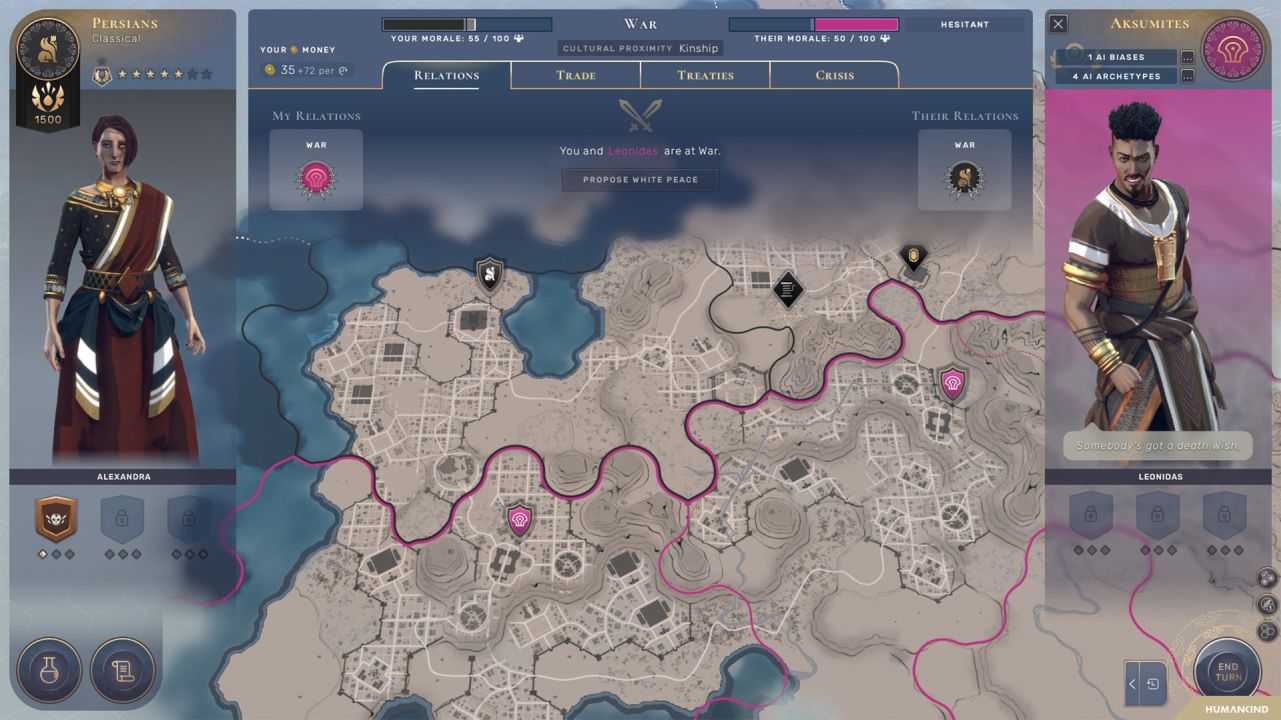
With all settings adjusted to your liking, you step out into the world with your sole tribe clan in the Neolithic Era. You can set your units to auto-explore, and they will begin to roam the map picking up Curiosities (i.e. discovering bits of resources and info to expand their Influence score). Within a few turns, you can found your first settlement, and a few turns later you can spend Influence again to turn it into your first city. You can also fight some animals and ransack their lairs for added bonuses. With your first city, you can begin to build structures within, upgrade the nearby resource tiles for food and industry, and start your science tree progress. These main mechanics are pretty much identical to the Civilization experience.
Where things start to get a bit different is how you progress through the Eras. In each Era – from the Ancient to the Contemporary, you have a set of stars that can be earned by performing feats, all to increase your empire's Fame score - a sort of meta-number that ranks you with other nations. To earn stars, you have to achieve certain performance numbers – having a certain population, earning a certain amount of money and influence, having a large military, or researching enough new technologies. Your progress to the next Era is gated by having enough of these stars. You can only earn three stars per category in an Era, so this presents a problem for empires that wish to focus on certain areas. Falling behind in any one area will leave you behind the pack, and while there is a "catch up" mechanic that awards you generic stars if the rest of the world has entered a new Era, this Fame score Era gatekeeping will require an adjustment to strategy.
As you manage your empire through the Eras, you'll have to make sure your cities grow, increase their production, and construct new structures inside their walls. A lot of this is pretty much identical to how you manage things in Civilization. A new concept for Humankind is the idea of Outposts. Unlike Civ, where your city's territory grows outwards exponentially, the world of Humankind comes with pre-carved areas. Placing a city in this area claims it for you, but to expand further you have to build Outposts. Outposts let you grab any strategic resources on that territory, but you can't improve or build anything else unless you convert it to a city or attach it to an existing one. The game only allows a few cities as you progress through the Eras, so it's a worthwhile mechanic that prevents nations from having to micromanage tons of cities.
Another decision to make as you progress through the timeline is choosing your Culture. This is what actually gives your nation its real-world foundation, and where you choose to become the Babylonians, Greeks, Romans, French, Germans, and so on. The culture that you pick gives you a unique unit and some bonuses – pretty much like selecting the nation in Civilization at the start. The twist with Humankind is that you can choose a new culture at every Era transition, letting you re-focus at a few stages of the game.
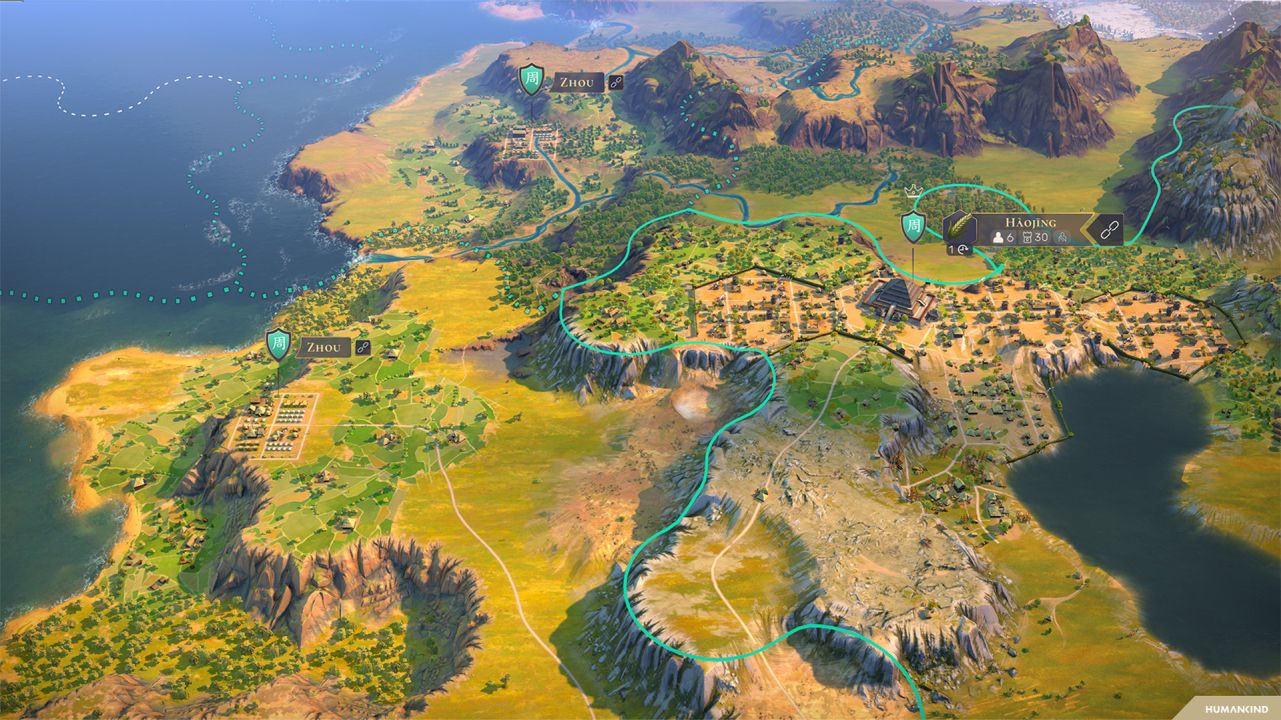
Managing your empire is not just about finances or resources, as you also need to deal with science, civics, influence and diplomacy. The science tech tree works and looks the same as Civ, as you unlock new structures and units over time. With Civics, you get occasional narrative events that ask you to make a choice, and present the outcome. You may have to deal with a plague, or decide if you should welcome or banish unexpected travelers. These decisions affect the alignment of the four social axis - economy, geopolitics, government and society - that deal with progress vs. conservatism, open market vs. strict regulations, and so on. The narrative stories are infrequent and do repeat often, but they are an okay way to adjust your national guidance once in a while.
Another way to directly affect the civics is to issue edicts, which become available after certain Eras or narrative events. These are stronger acts that swing your nation in a particular direction, and you need enough Inference to enact – and cancel them – as desired. Civic decisions can of course also have other bonuses, such as boosts to income or religion. Religion and Faith feels like a bit of a forgotten concept – you can construct Holy Sites and again get some bonuses from Faith over time, but it's not an area that the game demands a lot of focus on. Last but not least, Influence is sort of like Civilization's Culture currency. You acquire it overtime and it can be boosted by certain structures, and you spend it on constructing new outposts, Wonders, and upgrading outposts to cities. It's an important currency and is tracked right alongside your gold, the only two numbers readily available on the main UI screen.
While you have your hands full trying to steer your own people, there are also others to worry about. There's the expected other nations, who you will have to deal with either diplomatically or by force. In diplomacy, there are just a few actions that can be done, such as open borders, sharing maps, trade, and of course forming an alliance. The AI has their pre-set personality traits so getting things done can be challenging, depending on who you are dealing with. For the most part though, Humankind seems to be a peace-focused game and war is rare. There is an option to play with Peace Mode, which prevents any armed conflict between nations – unless the player triggers it against the AI.
There are also the so-called Independent Peoples to deal with. These act similar to Civ's City States, as they can be either peaceful or warmongering. They have a single city and a few units roaming about, and you can earn their trust by either Influence or gold, and even choose to absorb them and make their city part of your empire. Or, you can leave them be, and perhaps just temporarily hire their units for your own work. These cities will be founded and crumble across the early Eras, and stop existing altogether in the second half of the campaign, which makes sense logistically but is crudely implemented.
When it comes time to wage war, there are a few differences again between Humankind and Civ, but they are different for the sake of it, and don't offer a ton of depth. Military units are similar to the choices in Civ, from basic foot soldiers in the early days to commandos and Nuclear Missiles in the late Eras. They can only stack in limited squad numbers, so there is strategy involved in how you move around the map. Individual battles between units take place on a mini-conflict map, where you can position individual squads and take advantage of the terrain. It feels like a tiny simple version of Total War, and after a few such battles, you'll realize they take forever and it's better to just auto-resolve or retreat (for which there is interestingly no penalty). When attacking a city, you can lay siege and construct catapults as you wait out the enemy. There are air, land, and water units, and the basics are very much in line with what 4X players would expect. One thing that's different is the lack of worker units, so all the land improvements are just placed by you directly.
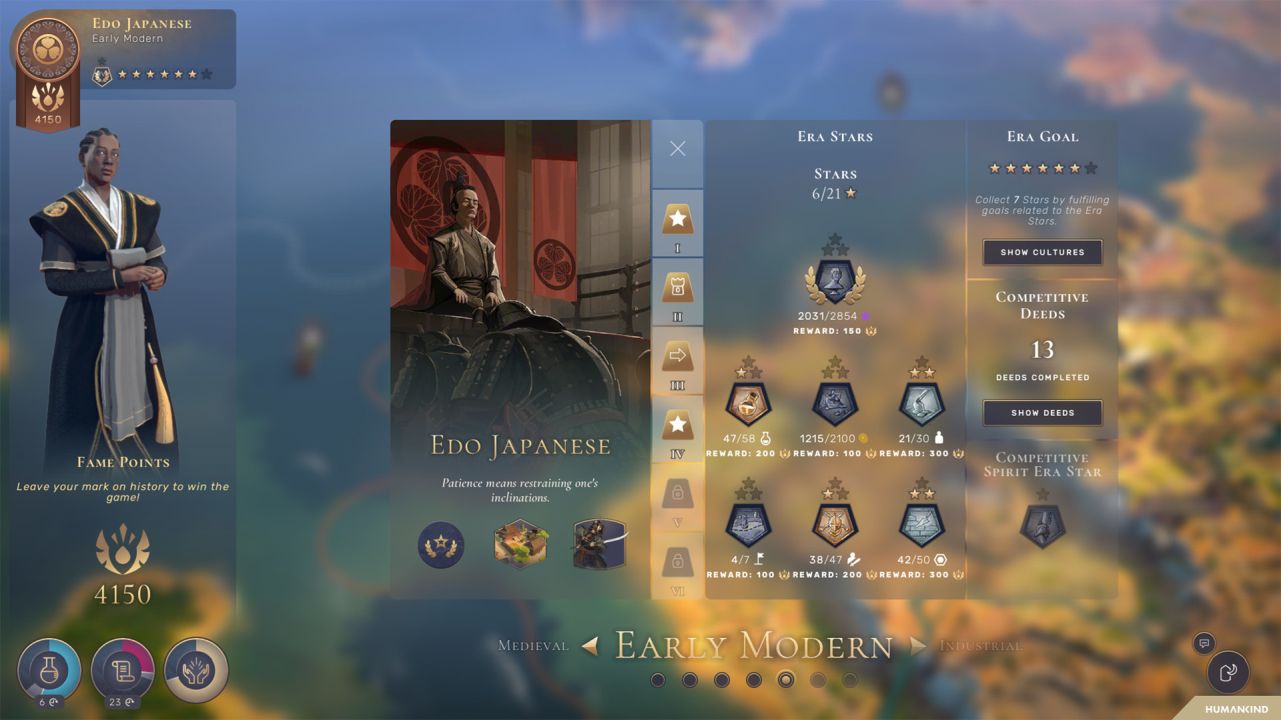
Speaking of placement and user interface – once again, it looks and feels very much like Civ, but with a few shortcomings. The tutorial goes over the concepts a bit quickly and it will take a few games to get used to the unique elements of this title. The interface is fairly clean, but there is an issue with way too many windows that often overlay each other, and it's possible to progress through turns without closing big menus (such as research tree or civics). There are tons of popups for all the various events that occur each turn, but they can be thankfully hidden. Another weak point is the fact that the game uses a very monotone color palette – everything looks the same shade of blue, and so the urgency of some notifications gets lost. Last, but probably not least, is the issue that scrolling around the map with mouse on screen edge or the keyboard is extremely slow. This will probably get changed, but for now you have to click the map and drag the view instead.
Another unique aspect to armed conflict is the War Score mechanic. Unlike Civ, where you are in full control of your empire, it is the people of Humankind that dictate how long a war can go on. You can build up this War Score meter by having grievances against other nations, such as them trying to push a new religion onto your peoples, or breaking agreements. When a war is declared, both side begin to lose their War Score if they do not keep emerging victorious in battle. This means you must constantly push onwards and not linger to rest or rebuild your forces. If the War Score reaches zero, you are force to surrender, regardless of what has actually occurred up until that point. While this forces you to think differently and twice before engaging in a war, the mechanic ends up being fairly annoying and at times unfair. But, as mentioned, war is not a frequent occurrence with the AI of this title, so this doesn't come up often.
If you are in the select few who enjoy playing a 4X game such as this with others, Humankind does offer multiplayer. However, the experience at launch is less than stellar. For one, there are numerous issues with even getting connected for users on the Xbox marketplace / Xbox Game Pass. Once you get that solved, the multiplayer lobbies are just a list with no useful filter options, so the goal is clearly to play with someone you already know. That's probably a good idea anyway, due to the time commitment. Whoever you play with, the multiplayer begins to get quite buggy and face desync issues the deeper into a game you go. Those primarily hoping to play with friends are best to wait a bit until the issues are ironed out.
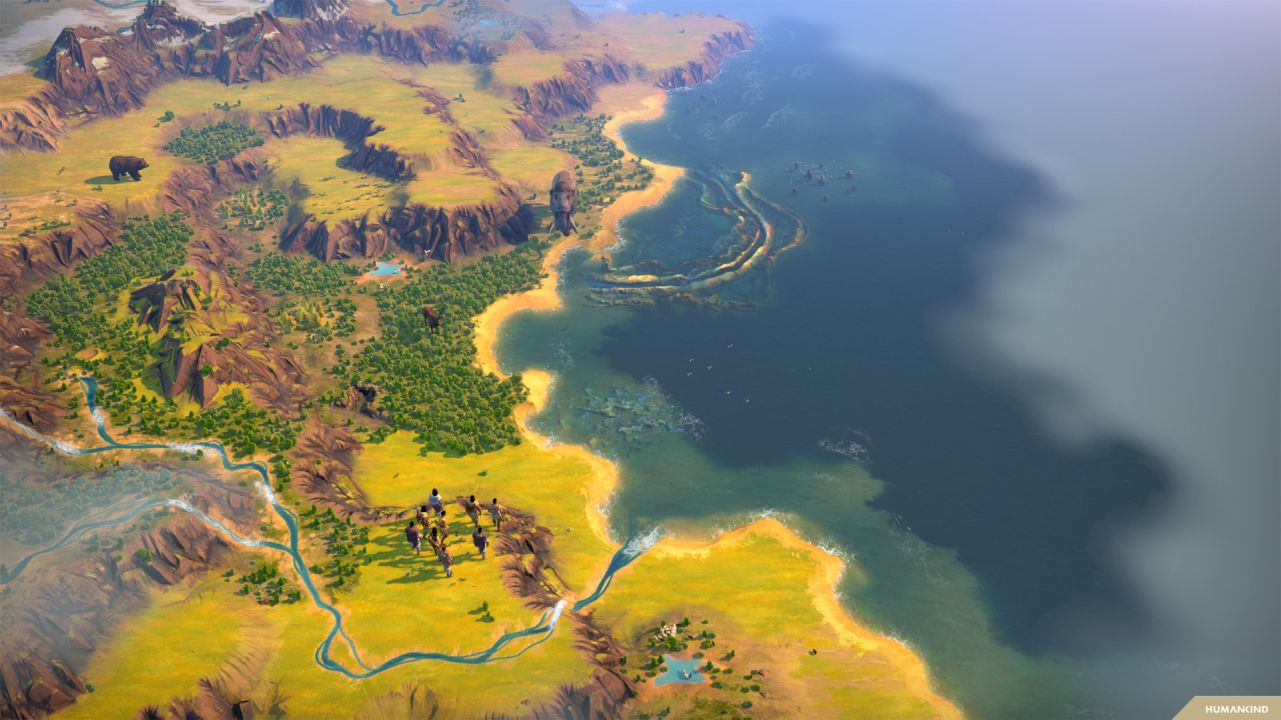
In single player though, the game performs admirably well. There is a wealth of options to scale the visuals to good performance levels for your hardware, and even if you are 600 turns deep with multiple AI factions on a huge map, the turns don't take too long. It's a nice looking game for 4X standards, though the art style is a bit generic and there is a repetitive cutscene before and after every game, as well as when moving to the next Era. The music is fitting, and there is a narrator that occasionally discusses your choices and progress – again, Civilization vibes are simply everywhere.
Humankind does only just enough things differently to consider itself a standalone experience, and not just a spinoff to the Civilization franchise. It’s difficult to avoid direct comparisons when so much of the experience is closely tied to one of the biggest 4X franchises out there, and so the gaps in gameplay and accessibility become quite readily apparent. The notion of requiring Fame to progress through Eras is a good idea, but one that's in need of balancing – as is the overall pace of the game, which sees you reach the turn limit (which cannot be turned off, but you can play past it) before any actual goals, except in very specific circumstances. If you've had your fill of Civ over the past few years and want to experience something a bit different, but within your comfort zone, and accept that various things still need fixing, then Humankind is probably worth a look. For newcomers to the genre, it's probably best to wait and see if this title can overcome its issues and grow into a worthwhile entry in the genre.
 Comments
Comments













